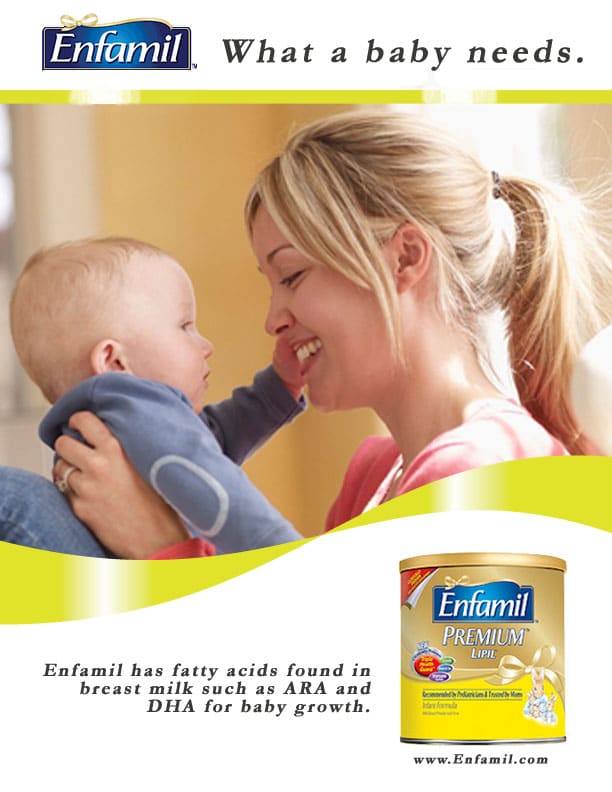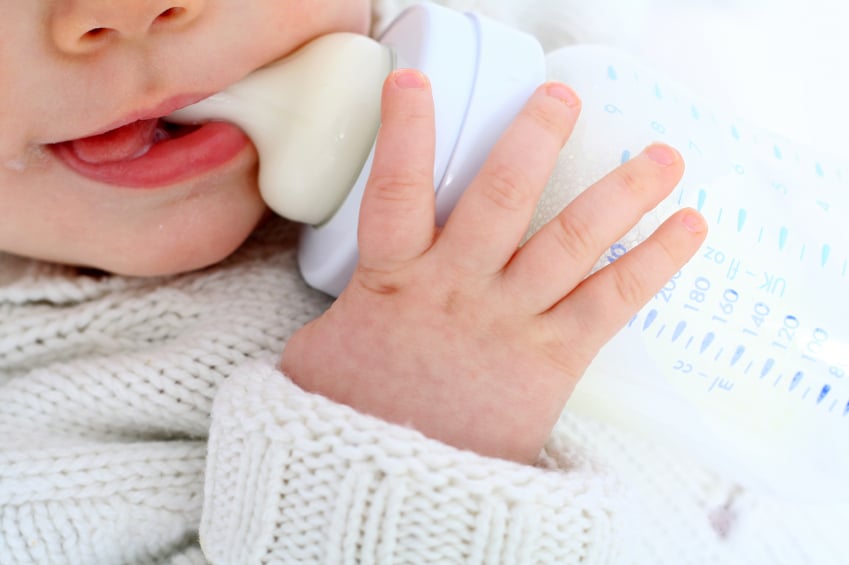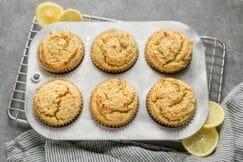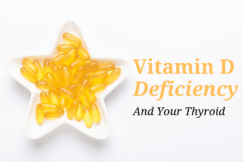
When I had my two girls, I didn’t know much about unprocessed, organic foods. I ate a “typical” American diet and rarely glanced at a list of ingredients on a label. That was the FDA’s job, right? Without knowing better, I assumed that food manufacturers were only allowed to sell food that was safe.
When my first daughter was born, I had a very difficult time breastfeeding her so I turned to canned formula just like every other mother I knew who wasn’t breastfeeding. When my second daughter was born we started her on formula from day one. I never thought to read the ingredients in those formulas. We trusted the manufacturers were making the healthiest possible alternative to breast milk.
Over the next few years, motivated by health issues my doctors weren’t able to solve, I learned about what’s in our food supply and I transitioned our family to an unprocessed, organic diet. One day when I was shopping in the grocery store I decided to walk down the baby aisle to read the labels of the formulas I’d fed to my girls. I stood there under the florescent lights at the military commissary and wept as I read. I had no idea I was feeding my girls large amounts of sugars and preservatives. Why hadn’t anyone told me what was in the canned formula? Why didn’t I ever think to read the labels? If I had known there were alternatives, maybe I would have made a different decision. But without the knowledge I didn’t even know there was a choice. My heart ached and I was angry.
This is a sensitive topic and I understand that. I am not trying to cause panic or make anyone feel guilty. But I’m a huge advocate for making educated decisions, especially when it comes to our health. Only when we know both sides can we make wise choices for ourselves. So before we begin, please know there is no judgment here. We aren’t pointing fingers or trying to sell you on one side or the other. I’m simply doing what I wish a friend had done for me: discussing the alternatives to canned infant formula. After reading this post, I hope you feel armed with knowledge so you can make the best educated decision for you and your baby.
I’ve wanted to write about formula for more than a year but didn’t feel like I had the expertise to address this topic. That’s where Bruce Bradley comes in. Bruce worked for more than 15 years as a food marketer at companies like General Mills, Pillsbury and Nabisco. In 2008 he left the corporate world to begin his own consulting business and wrote his first novel, Fat Profits. Bruce is one of the only former processed food marketers actively speaking out about concerns over the food we eat. I’m grateful for his willingness to share his knowledge with us today in this guest post.
As parents we want to see our children flourish. We want the very best for them, and we’re willing to make huge sacrifices to help them grow up to be happy and healthy adults. But let’s face it, all the decisions can be overwhelming and that’s especially true for new parents.
One of the first and most important choices new parents face is what to feed their baby. Ideally most newborns are breastfed, but as many new moms (and dads) quickly find out, breastfeeding doesn’t always go so smoothly. What should you do then? How good should you feel about most formulas? And what other alternatives can you pursue? While the truth is there’s no one right answer for every circumstance, hopefully with more information and resources, you can make the best decision for you and your child.
So how good of an alternative is formula feeding? Well, if you listen to the Big Three formula manufacturers (Mead Johnson—Enfamil, Abbott—Similac, and Nestlé—Gerber), you’d think it’s excellent. Frequently these companies run advertisements like the one below which do everything but say their formula is as good as breast milk.
These companies also spend millions of dollars to get medical professionals endorsing their products via sampling programs in doctors’ offices and hospitals. But there’s a pretty simple fact that formula companies ignore when they promote and advertise their products, but will freely admit when asked directly in interviews. “Breast milk is the gold standard; it’s the best for babies,” says Christopher Perille, a spokesman for Mead Johnson.
Yes, from reducing ear infections, asthma, and digestive problems to even posting slight improvements in I.Q., breastfeeding is best for your child. Breastfeeding also has health benefits for mothers like reduced incidence of diabetes, obesity, osteoporosis, and even some cancers. (For more information, visit The World Alliance for Breastfeeding Action’s report, The 21 Dangers of Infant Formula)
But if you choose to formula feed or have difficulties breastfeeding and feel forced to look at other options, are all formulas created equal? The sad truth is, “no.” And while you might think there are lots of good formula options on the market, you might be surprised for several reasons:
- GMOs: Unfortunately the same food labeling laws that allow GMOs to lurk in most of our processed foods also allow them to hide in baby formulas. If you’re trying to keep your child away from genetically modified ingredients, then definitely choose a formula labeled “organic.”
- Growth Hormones: Since most formulas are made from cow’s milk, many parents are also concerned about the controversial growth hormones (rBGH / rBST) that are used by the U.S. dairy industry to increase milk production in cows. You might think formula manufacturers would take extra precautions to protect the health of infants, but you’d be wrong. From my research, all the major non-organic brands of formula use milk from cows treated with growth hormones.
- DHA/ARA: Since 2002, most manufacturers have fortified their formulas with DHA/ARA, naturally occurring nutrients in breast milk that aid brain and eye development. So what’s the problem? The DHA/ARA used in almost all formulas is made from laboratory-grown fermented algae and fungus that’s processed using a toxic chemical called hexane. Furthermore, a Cornucopia Institute report has determined fortified DHA/ARA “are structurally different from those naturally found in human milk” and may have no benefit to the babies consuming them. Unfortunately many organic brands of formula use these questionable DHA/ARA nutrients, so they are very hard to avoid.
- Preservatives: Sadly many of the more popular baby formulas use preservatives. But what’s so surprising is many organic brands have some preservatives in them as well. The Cornucopia Institute recently exposed the use of synthetic preservatives in many organic formulas “to prevent the oxidation and rancidity of the controversial patented supplements DHA and ARA.”
So are there any commercial formula options that pass all the above criteria? In the Cornucopia Institute’s online guide on formulas Baby’s Only Organic is the only brand that’s GMO/hormone free and doesn’t use the suspect DHA/ARA blend described above. However, there are a couple of questions that frequently come up when consumers inquire about Baby’s Only Organic formula. First, since it’s described as a toddler formula people wonder if it’s okay to use as an infant formula? According to its manufacturer (Nature’s One), Baby’s Only Organic formulas “meet the nutritional requirements of the FDA’s Infant Formula Act.” However since Nature’s One wants to encourage infant breastfeeding, it doesn’t promote Baby’s Only Organic as an infant formula. Second, Baby’s Only Organic uses brown rice syrup and older versions of its formula were found to contain elevated levels of arsenic due to environmental contamination issues affecting rice. Nature’s One has addressed this issue and Consumer Reports has confirmed that Baby’s Only Organic formulas have undetectable levels of arsenic.
Who knew choosing a baby formula could be so complicated? If this information has you more determined than ever to breastfeed and you’re looking for additional resources to help you succeed, The International Lactation Consultant Association provides excellent support and assistance for nursing mothers.
If you’d like to look into alternatives to breastfeeding or canned formula, the Weston Price Foundation has some great recipes for making your own homemade baby formula and tips on how to fortify canned formula. They also include a nutrient comparison chart and other tips on how to feed your baby a nourishing diet. In fact, in their price comparison, they show that it’s actually cheaper to make your own formula than it is to buy it from the store. It’s a great alternative – one I wish I’d known about when my daughters were babies.
Here are a few other great resources:
Super Nutrition for Babies
The Nourishing Traditions Book of Baby and Child Care
Weelicious – Catherine has lots of great homemade baby food recipes.
Bruce Bradley’s blog – to learn more about the tricks, traps and tools Big Food companies are using to get you eating more processed foods.
If you know of further resources, please share them in the comments below.








94 Comments